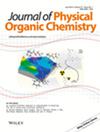Quantum chemical explanation and APT atomic charge index of substituent orienting effect proposed by DFT calculation and MO Theory
IF 1.9
4区 化学
Q2 CHEMISTRY, ORGANIC
引用次数: 0
Abstract
In organic chemistry textbooks, the electron resonance states are used to explain the orienting effect of benzene substituent. However, these resonance states do not exist in the C6H5‐S + E+ electrophilic addition, so the resonance state discussions actually are meaningless. The density functional theory (DFT) calculation shows that the C6H5‐S + E+ addition follows the transition state theory and needs to overcome a barrier. Benzene molecule C6H6 has two degenerate highest occupied molecular orbitals (HOMOs), but after becoming substituted benzenes, the two HOMOs split to HOMO and HOMO‐1 with different orbital energies and electron distributions. It makes the addition barrier on two or three benzene ring carbons is low, and the addition rate is fast, but the barrier of other carbons is high, and the rate is slow. Therefore, substituent splits the two degenerate HOMOs of benzene molecule, which is the origin of substituent orienting effect. For the substituted benzenes with halogen group ‐X and electron‐releasing group, their HOMO images alone can determine that the two types of substituents are the ortho‐ and para‐orienting groups, but for the substituted benzenes with electron‐withdrawing group, their HOMO alone cannot determine whether the substituent is a meta‐orienting group. The study found that atomic polar tensor (APT) charges are a good judgment index of substituent orienting effect because based on its physic‐chemical model, the charges represent the number of active electrons on the benzene ring carbons. The DFT calculation gives the APT charges of 19 mono‐substituted and 12 di‐substituted benzenes and some aromatic molecules. The APT charges can all correctly determine their orienting effects, showing that APT atomic charge from quantum theoretical calculation is a good substituent orienting index.

DFT 计算和 MO 理论提出的取代基定向效应的量子化学解释和 APT 原子电荷指数
在有机化学教科书中,电子共振态被用来解释苯取代基的定向效应。然而,这些共振态在 C6H5-S + E+ 亲电加成中并不存在,因此共振态的讨论实际上毫无意义。密度泛函理论(DFT)计算表明,C6H5-S + E+ 加成遵循过渡态理论,需要克服一个障碍。苯分子 C6H6 有两个退化的最高占据分子轨道(HOMO),但成为取代苯后,两个 HOMO 分裂为轨道能量和电子分布不同的 HOMO 和 HOMO-1。这就使得苯环上两三个碳的加成势垒低,加成速率快,而其他碳的加成势垒高,加成速率慢。因此,取代基分裂了苯分子的两个退化 HOMO,这就是取代基定向效应的起源。对于带有卤素基团-X和电子释放基团的取代苯,仅凭它们的HOMO图像就能确定这两种取代基分别是正取向基团和副取向基团,但对于带有电子吸收基团的取代苯,仅凭它们的HOMO图像并不能确定取代基是否是元取向基团。研究发现,原子极性张量(APT)电荷是取代基定向效应的一个很好的判断指标,因为根据其物理化学模型,电荷代表了苯环碳上活跃电子的数量。DFT 计算给出了 19 个单取代苯和 12 个二取代苯以及一些芳香族分子的 APT 电荷。APT 电荷均能正确确定它们的取向效应,表明量子理论计算得出的 APT 原子电荷是一个很好的取代基取向指标。
本文章由计算机程序翻译,如有差异,请以英文原文为准。
求助全文
约1分钟内获得全文
求助全文
来源期刊
CiteScore
3.60
自引率
11.10%
发文量
161
审稿时长
2.3 months
期刊介绍:
The Journal of Physical Organic Chemistry is the foremost international journal devoted to the relationship between molecular structure and chemical reactivity in organic systems. It publishes Research Articles, Reviews and Mini Reviews based on research striving to understand the principles governing chemical structures in relation to activity and transformation with physical and mathematical rigor, using results derived from experimental and computational methods. Physical Organic Chemistry is a central and fundamental field with multiple applications in fields such as molecular recognition, supramolecular chemistry, catalysis, photochemistry, biological and material sciences, nanotechnology and surface science.

 求助内容:
求助内容: 应助结果提醒方式:
应助结果提醒方式:


